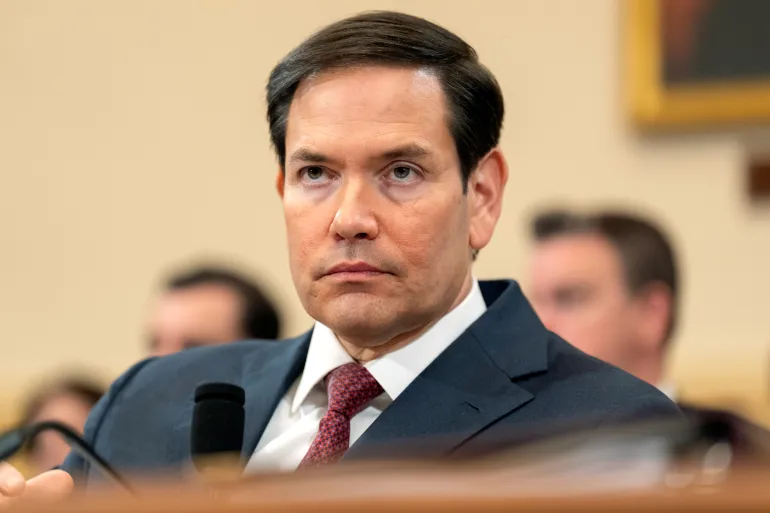WASHINGTON — Secretary of State Marco Rubio announced Wednesday that the United States will begin revoking visas for Chinese students, marking a significant escalation in the Trump administration’s efforts to sever academic ties with China over national security concerns. The move targets Chinese nationals with alleged links to the Chinese Communist Party and those enrolled in “critical fields” of study at American universities.

Rubio said the State Department will coordinate with the Department of Homeland Security to enforce the measure. “Under President Trump’s leadership, we will aggressively revoke visas for Chinese students, particularly those with CCP connections or involved in sensitive academic disciplines,” he stated.
The policy shift is expected to affect a significant portion of the Chinese student population in the U.S., which stood at over 270,000 during the 2023-2024 academic year, accounting for roughly a quarter of all international students in American institutions. China remains the second-largest source of foreign students in the country, after India.
Rubio’s announcement comes amid heightened scrutiny of U.S. academic partnerships with Chinese institutions. Republican lawmakers have raised alarms about potential “back-door access” to classified or sensitive research through university collaborations. In recent weeks, GOP members of the House pressed Duke University to cut ties with a Chinese institution, citing concerns over federal research exposure.
A 2023 House GOP report detailed how hundreds of millions in defense funding were allegedly channeled into joint research projects involving Chinese government-linked entities. The report warned of foreign adversaries exploiting academic loopholes to gain access to American technological advancements.
Meanwhile, Harvard University has become a flashpoint in this crackdown. Last week, the Department of Homeland Security barred Harvard from enrolling any new international students, accusing the Ivy League institution of coordinating with the Chinese Communist Party and training individuals affiliated with the Xinjiang Production and Construction Corps, a Chinese paramilitary group. The decision was temporarily blocked by a federal judge following a lawsuit from Harvard.
In a related development, Rubio also ordered the suspension of new student visa interviews, pending new guidelines that will include enhanced vetting of social media activity for applicants from China and Hong Kong.
The policy changes are sowing widespread anxiety among international students in the U.S., whose presence is critical to the financial stability of many tuition-driven universities. American colleges hosted around 1.1 million foreign students last year, who are largely ineligible for federal financial aid and typically pay full tuition.
“Contingency plans” are already being implemented at institutions such as Northeastern University, where over 20,000 international students are enrolled. “This is a very dynamic situation, and we are closely monitoring the developments,” said university spokesperson Renata Nyul.
Students affected by the shift are increasingly wary of leaving the U.S. for routine visa renewals. Vladyslav Plyaka, a University of Wisconsin student from Ukraine, said the suspension of visa appointments has left him uncertain about traveling to Poland to visit family. “I don’t think I have enough trust in the system at this point,” Plyaka said. “I understand it’s for security reasons, but I’d rather finish my studies and return home after graduation.”
The Trump administration has already drawn criticism this year for attempting to deport international students involved in protests over the Israel-Hamas war, and for abruptly revoking their legal status before reversing course and broadening deportation criteria.
Speaking from the Oval Office Wednesday, President Trump doubled down on his administration’s scrutiny of universities with large foreign student populations. He said Harvard should limit its international student percentage to around 15%, down from the current 25%.
“I want to make sure the foreign students are people that can love our country,” Trump told reporters. He added that many international students are coming from “radicalized regions” and may pose security threats.
The White House has also moved to cut more than $2.6 billion in federal grants to Harvard amid its ongoing battle with the university over its enrollment policies and research affiliations. Trump has accused the Ivy League school of harboring liberal extremism and antisemitism—claims the university has strongly denied.
Rubio echoed the president’s concerns by revealing the State Department will revise visa criteria to include stricter evaluation of applicants’ social media presence, ideological alignment, and affiliations with entities linked to the Chinese government. While visa applicants have been required to submit social media handles since 2019, the new guidelines will require more in-depth review, though specifics remain unclear.
The renewed focus on Chinese students and research partnerships represents a return to a key Trump administration priority from his first term: curbing Beijing’s influence within American academia. During that period, the Education Department launched 19 investigations into foreign funding at U.S. universities, finding that many institutions underreported financial ties with China, Russia, and other adversarial nations.
Responding to pressure from lawmakers, Eastern Michigan University announced earlier Wednesday that it would terminate its engineering partnerships with two Chinese universities. The announcement came just hours before Rubio’s press statement and followed calls from Rep. John Moolenaar, chair of the House Select Committee on the Chinese Communist Party, for schools to dismantle any academic cooperation with China.
While administration officials emphasize national security, advocacy groups warn that the visa crackdown risks damaging the U.S.’s reputation as a global hub of education and innovation. Jonathan Friedman of PEN America said the vague policy details could “upend the long-standing place of the U.S. as a beacon for intellectual and cultural exchange.”
With universities caught between compliance and financial pressures, and foreign students navigating an increasingly hostile regulatory environment, the administration’s aggressive stance is poised to reshape the future of international education in the United States.



